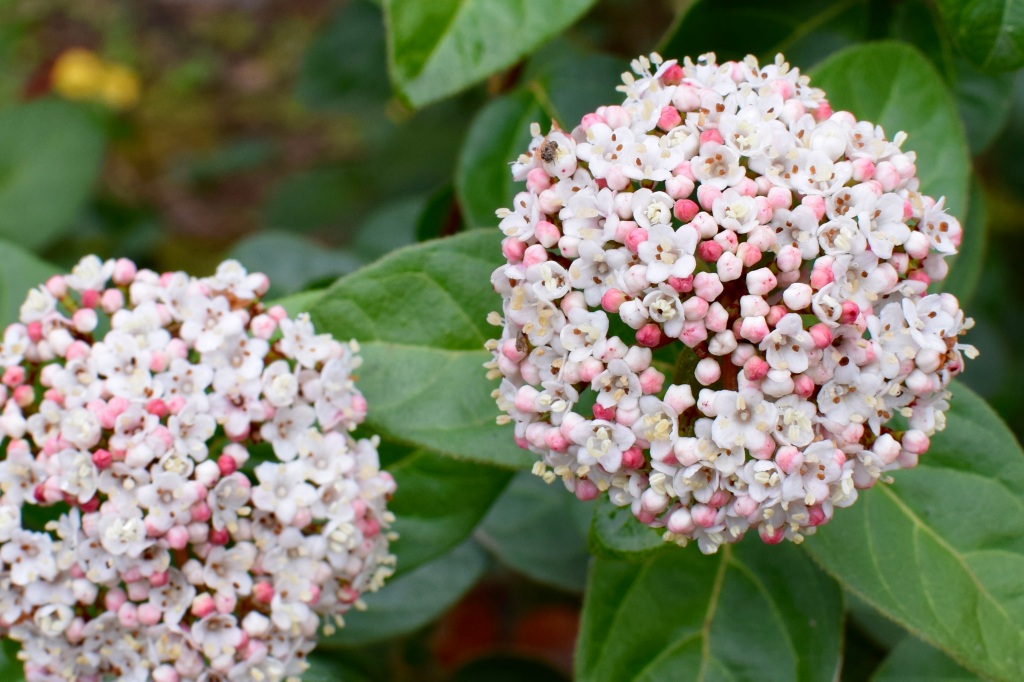
It’s the middle of March and the viburnums are returning. A mild winter has been tender enough for most of their umbrella-like clusters to survive a season that in recent memory scarred them all.
There are still several scars left from two winters ago. A single-digit winter that left it ice-burnt brown. Half of the six-foot-tall shrub remaining, cut back until resembling a large, cracked bowl. This winter has been kinder but not without casualties. Three of the small tree’s umbels (the name for its clusters) are dead and brown, like rust on old cast iron, untreated and left to the rain. Or chocolate, long neglected, exposed to air and time, shedding all its oil.
The rest of the flower heads, having spent the last two months as tightly-bound magenta beads, are now opening. Pale pink flowers no bigger than a lentil seed. Sunlight scatters over a sky not quite blue, not quite white, but decidedly cold. Cold enough to see our breaths. To feel ourselves somewhat stiffen in the breeze.
I don’t know if my mother or my grandmother knew what viburnums looked like. I never saw them grace any of the houses of my youth. I did not know what they looked like until my late twenties.
Across the street, two landscapers have arrived. Large patches of circular eruptions—the wide leaves and rapidly straightening stems of fleabane—dot the small, mostly flat lawn. In less than two minutes, a riding lawnmower shears them away. They will return soon. They always return. One of the men then runs a long-necked edger from end to end. The other man blows pine needles out of the driveway and into the street. Some of the needles swirl and drift down the sloping blacktop, landing in the shoulder of the house next door. Soon, the landscapers finish up and leave, the needles still strewn about the curbside.
My father’s birthday was three days ago. He would have been 77 had he not died at 55. 22 years of flowers at his grave have gone by. 22 years since I last saw him slumped and sleeping in a dark gray suit, in a mahogany box, lined in cream satin, adorned with brass handles and surrounded by flowers. The wall between us in life, erected through years of abuse, was now a universe.
22 years since I last saw my mother’s face, tear-less and staring at the body in the front of the church. She was there the moment he died.
22 years since my brothers’ disapproval of my presence. My sister’s absence from the moment altogether.
22 years of knowing the door of this family was closed to me. I don’t remember the faces of other relatives, only how they kept their distance.
The only flowers at his funeral were roses and Easter lilies. All white.
Viburnums, many of which come in shades of white, are said to represent pride. They can sometimes be difficult shrubs to grow, though other plants make for far more precarious undertakings. Still, conditions must be right for viburnums to bloom, much less thrive. A certain range of acidity and alkalinity in the soil. A particular tenure of daily sunlight, of afternoon shade. However, once they are established, they are stalwarts of the garden. Some varieties may take several years to bloom. Others are more immediate but far less redolent.
I think about the last words my father had for me. “People like you ain’t worth shit.” Queer people, he means. People proud to be queer, he means. [A proviso: this pride should be distinguished from Pride™, the liberal assimilationist way of queer-being.] I recall that it must have been pride that undergirded my response: “If I ain’t shit, what does that make you?” I withhold the sharpest of my knives for my final words to him. They will come true five years later.
I am now roughly eight years younger than my father was when he died. This fact lingers in every morning’s air. It always lingers heaviest this close to his birthday. Only more so now, because of how close we are agewise.
The fragrance of the Korean spice viburnum this morning is slight, no doubt slighted by the lower temperature. Something in its altered scent brings to mind some flower my mother grew. What it was exactly hides behind a certain opacity. I can only leave it there, to fade as the sun begins to touch the garden.